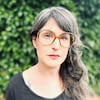To everything, there is a season, right? Not if you’re one of the hundreds of plants in Loree Bohl’s home garden. Portland’s most determined plant-head began chronicling her adventures
in cultivating agave, cactus, yucca, and other non-native plants in 2008 on her blog, The Dan- ger Garden. Since then, her spiky, spiny backyard oasis has become the stuff of local legend; her first book, Fearless Gardening: Be Bold, Break the Rules, and Grow What You Love, was published by Timber Press in 2021. Her garden’s inhabitants may not hesitate to cut a bitch, but Bohl’s not about to let that stop the fun. Below, her tips for getting feisty with your flora.
I initially got interested in spiky plants when I was living in Seattle and working for Williams Sonoma. The company had annual meetings in Phoenix. Having spent my entire life in Spokane and Seattle, flying into Phoenix and taking the bus from the airport to the hotel and seeing that plant palette—I was instantly in love. My brother moved there several years later, so I visited him a lot and immersed myself in the plants there. So when my husband and I moved to Portland in 2005, I realized that I could grow a lot of those plants in this climate. I come from a gardening family; it’s just always been part of my DNA. But the plant culture here in Portland is so exciting, as far as the things that are available. I just wanted to grow everything!
For a beginner, something important to keep in mind is that a garden doesn’t happen all at once. I did mine in little chunks because we didn’t have the time and money to plant everything right away. I started with a little segment between the driveway and the front of my house. It was small, but it gave me something to look at as, OK, I’ve done this. I’ve gotten started. I knew it would be years before I could get to everything, but because I took my budget and bought plants to fill that one little space, rather than spreading the plants out, it maximized my immediate results.
Another thing to keep in mind is that you’re going to kill plants, and you’re not going to know why. And that’s OK.
My gardening style is “crams- caping.” I believe there is always room for another plant. I hate looking at bare soil, and when you have bare spots, that’s where the weeds are going to come in. I’m much more comfortable with overplanting. I like my plants to touch; it’s all about the relation- ships and the intermingling. Also, I’ve always been big into contain- ers—they allow me to grow things that aren’t going to be happy in the ground.
Agaves will always be my No. 1 plant. I love the architecture of them. They’re just not like any other plant out there. But all gardeners go through phases: At the moment, I’m in an epiphytic fern phase. I just can’t get enough of them.
There are challenges to having a lot of non-native plants in Portland. Winter wet is probably the biggest one for plants that thrive on less water. With agaves, for instance, there are many that are temperature-hardy, but they like to be dry in the winter. So making sure they have plenty of drainage is important. Research is your friend when it comes to growing things that aren’t normally seen here. That can take the form of driving around your neighborhood and getting ideas from seeing what other people are growing, talking to your neigh- bors, and getting tips from people at local garden centers.
I have so many favorite local nurseries. Cistus, on Sauvie Island, is great. Xera has wonderful climate-adapted plants. Pomarius Nursery is always amazingly in- spiring to walk through. Portland Nursery, of course, has everything. South of town, Secret Garden Growers in Canby is amazing for specialty plants, and they do mail order. Sebright Gardens in Salem and Gossler Farms in Springfield also do mail order.
The Hardy Plant Society of Oregon’s annual spring sale, Hortlandia, is a must-do: Dozens of area nurseries bring their plants, so it’s one-stop shopping. Membership in the Hardy Plant Society is also a great way for beginners to learn.There are mem- ber gardens open every weekend, so you can visit in person and get ideas. I highly recommend it.
Plant injuries do happen. Years ago, my garden was open for a tour, and two ladies stepped into a planting to take a picture and an agave poked them. One of them, her shoe was filling with blood and she didn’t even notice. You might feel a poke, say “Ow!” and not real- ize you’re bleeding. But just clean it, cover it, and get back out there.
This story is part of Nester, Willamette Week’s annual home magazine. It is free and can be found all over Portland beginning Friday, Sept. 22, 2023. Find your free copy at one of the locations noted here, before they all get picked up! Or, order one through our store.
